
Publisher:
Bonnie King
CONTACT:
Newsroom@Salem-news.com
Advertising:
Adsales@Salem-news.com

~Truth~
~Justice~
~Peace~
TJP
Mar-17-2011 02:42

 TweetFollow @OregonNews
TweetFollow @OregonNews
A Ruler With a Stronger Juju
Kiflu Hussain Salem-News.comUgandans have opportunities, unlike their counterparts in Ethiopia, but then don't always use them for the betterment of their future.
 Yoweri Museveni - courtesy: ugandansabroad.org |
(UGANDA) - Since holding election under a bogus multi-partyism has become more of a fad in Africa after the cessation of the Cold War, Uganda too has passed through one of this ritual and held a presidential and parliamentary election on the 18th of February. As I have been living in Uganda since 2007, I happened to witness the politics of this country from close up.
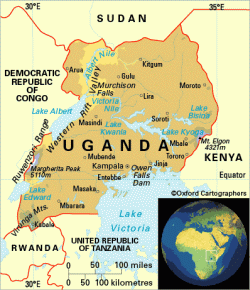 |
Oftentimes, I found myself collating situations in Uganda with that of my country, Ethiopia. Having absconded from a fully blown tyranny that no longer attempts to cloak itself with pseudo-democracy wherein cold-blooded snipers were unleashed that didn’t even spare children as little as five year olds on top of a sweeping arrest that included opposition figures, activists and journalists in 2005, I was dazzled by the apparent freedom of space in Uganda.
Among the high points that impressed me so much was the numerous private TV channels and FM stations. Nonetheless, it didn’t take me long to be nagged by questions such as why Ugandans are unable to use this apparent freedom of the press to come up with a cogent alternative and send the current degenerating system to the dustbins of history. I do not pretend to have found answers to these questions.
All I did is highlighting the opportunities Ugandans have unlike their counterparts in Ethiopia and why I think they failed to use them for the betterment of their future.
Similarities and differences between Ethiopia and Uganda
Before I point out the similarities and differences of the two African nations, I would like to remind the few conscious Ugandans who blew a gasket over the outcome of the February “election” of how it could have been worse.
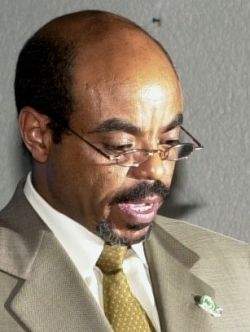 Meles Zenawi of Ethiopia |
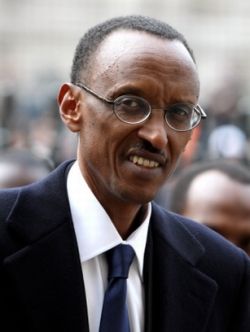 Paul Kagame of Rwanda |
Although, it may sound a poor consolation, Yoweri Museveni too could have claimed a ninety plus percent victory like his comrades such as Paul Kagame of Rwanda and Meles Zenawi of Ethiopia. Since he is modest, he told his handpicked Chairman of the Electoral Commission that he would be satisfied with any result that ensures his “continuity” over “change.”
Also, we should never forget the fact that Museveni could afford to taunt his Western backers more than Kagame and Meles who unlike him don’t seem to have many cards to play against their donors. Besides posturing as an ally on the “war on terror,” Uganda under his watch has discovered oil.
Thus, in addition to bluffing over the withdrawal of his troops from Somalia; he could also send terror on the spines of the gluttonous Western business interest by striking a deal with the Chinese or with the Persians. After all, Kagame scared the sh-t out of the “international community” by threatening to withdraw his troops from Darfur. Meles, for his part, refused to be bossed around by his Western financiers over his total clampdown of press freedom. He told them unequivocally that he would purchase Chinese technology with their money to continue jamming VOA after equating it with the infamous Radio Mille Collins.
In Uganda, on top of listening to VOA, BBC and France International on FM stations, you can also watch live VOA Straight Talk Africa, a call-in talk show that is invariably critical of the Museveni régime. That’s not only impossible in Ethiopia. It’s simply unthinkable. You can take this as number one big difference. Their similarity; both Meles and Museveni are self styled liberators who emerged from the bush.
While the latter embraced nationalism, the former started out his career in the bush as ethno nationalist who grudgingly donned Ethiopian nationalism for the sake of assuming power over that ancient land with untapped resources.
While it’s the official policy of Meles to pit one ethnic group against another under the pretext of “ self-determination of nations and nationalities” up to secession, Museveni, at least ideologically, tried to create Ugandan nationalism that you don’t see in a day to day activity like Ethiopia in the good old days. Of course, proponents of the “national oppression thesis” may describe that era as “colonization” by the Amhara ethnic group.
Well, we’ve moved on from “Amhara” colonization, a largest ethnic group to “colonization” by a minority ethnic group called Tigre. But this doesn’t mean that there is no tribalism in Uganda. On the contrary, Ugandans, the educated and uneducated alike, identify themselves with their respective tribe always remembering their Ugandanness as an afterthought. Despite his nationalistic movement then, Museveni too appointed people from his tribe, village and family on key posts that require absolute loyalty to a ruler. So Museveni shares a point on this one with his counterpart in Ethiopia while departing from him by not championing ethnicity. The other striking feature both of them were forced to adopt is pseudo-democracy. Although, Museveni resisted multi party politics initially, he granted free speech whereby private electronics media mushroomed.
Meles, on the other hand, had to put off the Albanian style socialism he envisaged for Ethiopians since his victory to the palace coincided with the collapse of the Berlin Wall.
So he reverted to hoodwinking Western powers by coming up with a transitional charter that incorporated the Universal Declaration of Human Rights. Unlike Museveni, however, and knowing fully well the impact of electronics media in Ethiopia, he never allowed for any independent investor to go into that sector. He also made sure that the circulation of the few independent print media will not go beyond a minority section of the society in bigger cities such as Addis Ababa and Dire Dawa.
While Ugandan journalists are routinely bailed out as they are routinely charged, their Ethiopian counterparts invariably experience incarceration without any due process of the law. Since the judiciary is under the heel of Meles Zenawi, no journalist or dissident expects to get a fair trial in Ethiopia. One hears news of Ugandan journalists defeating the regime in a court of law to the extent of securing a judgment to scrap unconstitutional provisions.
Ethiopian journalists, on the other hand, are thrown into the slammer with life imprisonments and death sentences. So am I concluding that Museveni is a democrat at heart? Not at all.
At the risk of sounding jingoistic, I would say that Ugandans are not inquisitive enough to inform themselves despite having a better opportunity by the region’s standard. Lethargy and deficiency of thinking in terms of posterity seems to be the national character. To their virtue, Ugandans admitted good-naturedly on BBC Network Africa to this fact when a survey recently showed that laziness is the norm in Uganda. I read in the Daily Monitor about a Ugandan lady who survived the July 7, 2010 bomb blast. Until that fateful day, she had no idea that Ugandan soldiers were sent as peacekeepers in Somalia. Had it been in Ethiopia, I wouldn’t have been surprised since the regime keeps this sort of information with total secrecy.
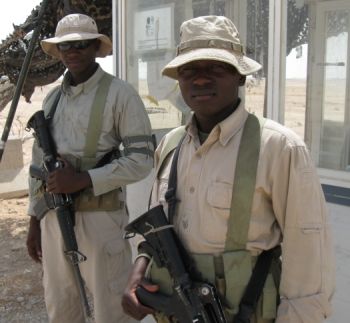 Ugandan soldiers deployed in war - Photo by Tim King |
Yet, in Uganda, whenever a Ugandan soldier gets hit in Mogadishu, the local Medias themselves inform the public. To ferret out information, an Ethiopian with the existing lousy internet connection had to go round to access the various blocked websites which is not affordable to the majority of Ethiopians.
Despite being the seat of African Union with its rich history of anti-colonialism in the background, it’s still a rare luxury to see or hear live political debates and critical talk shows in Ethiopia. In 2005, Meles Zenawi’s regime miscalculated in a typical delusion that always characterizes tyranny, thus granted a wee bit space. He thought, he had bamboozled and cowed the public fully and went to the extent of promising a “flawless”election.
Hence, a few months before the May 15 polling day, live debates were allowed to be televised once in a week. The public that were fed up with the regime was not only receptive to messages imparted. Since the opposition responded to its call to “join forces together, or disappear altogether,” it overcame all intimidation and bribery alike, irrespective of its background as a villager or urban dweller. The brutal crackdown that followed after the polling day has not yet been fully reported by the “international community.” Its effect that turned Ethiopia into sheer totalitarian state once again, has also been not appreciated. Notwithstanding the 2006 debacle that saw Dr.Kizza Besigye briefly into prison and exile, Ugandans using the space under the existing system could have transformed themselves into a force of change for the better.
Yet, they failed to do that despite the abject poverty, social exclusion and rampant corruption. In the aftermath of February 18, different analysts came up with different thesis while agreeing on one point; that the election has been rigged long before people went to the polls. Some journalists also lamented; solely holding the opposition and the elite responsible for the failure to bring about change. To the best of my knowledge except one journalist named Timothy Kalyegira, none questioned the public’s readiness for change from stagnation.
The way I see it, even if the opposition failed to traverse the country to galvanize the public, which it didn’t, the public itself should have taken a proactive stance to shape up the opposition for its own sake. In Uganda, there are plenty of causes and serious issues to move against the incumbent and vote him out of office.
Amazingly, despite their squalid living condition; you will find many people rooting for Museveni.
These type of servility might be attributed to abysmal ignorance and abject poverty. But there are other types of people whom you call middle class and fairly educated. Some tell you that there is no one who can manage Uganda better than Museveni.
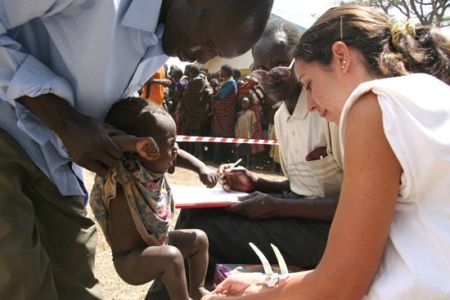 Uganda: Fighting Chronic Malnutrition in Karamoja - |
Others despite having no running water in their home most of the time, tell you that they have no beef with his administration. You will also come across with people who have simply given up after describing Museveni as a “colossus” who cannot be done away with.
Some Ugandans considered being pillars of the community amazes you in the interview they give to social columns. One such person when asked by Sunday Monitor what he despises most, answered “all elevated thieves.” When he was asked whom he admires most, he answered “President Museveni.
”Yet, it’s this same president who lacked the political will to deal with big time embezzlers such as his big cronies who have been linked with CHOGM fund misappropriation. Instead of encouraging the Media to expose maladministration, inefficiency and injustice, the Ugandan Human Rights Commission recently censured the media fraternity for exposing that Ugandans are dying of jiggers in this 21st century. In the “Human Rights” Commission’s assessment, that was sensationalism.
All in all, the mood in Uganda reminds me of a myth described in Frederick Forsyth’s “Dogs of War.” A British mining tycoon, who was desirous of plundering a certain African nation’s mineral resource, hired a mercenary to go down and assess the security situation of the seating president so that he can have him overthrown in a bloodless coup to replace him with his own stooge.
The mercenary reported back that security is so lax and it’s a cinch to overthrow the seating president without much ado. But before the tycoon warmed up to this news, the mercenary mentioned a snag in the whole exercise. He told him how the Africans believe that the seating president has a juju, i.e. a spirit that made him immortal. So if you just overthrow the president and banish him to exile, none of them would submit to the new president who staged the coup. But if he kills the seating president and displays the dead body, then the people would say “this one has a stronger juju.” It seems President Museveni has succeeded to inculcate this kind of aura about himself among his subjects.
Also in the name of “democracy” he has translated into reality what Idi Amin Dada only fancied; life presidency! Until the 1974 revolution burst the myth in Ethiopia, Emperor Haile Selassie too used to enjoy this sort of demi-god status. But then, there was no independent media that questions authority. In this time and age, how is this possible in Uganda?
Even the King of Buganda, a traditional leader of the largest ethnic group in Uganda whose “wings has been clipped” by Museveni congratulated him on his “re-election.”
An Ethiopian Refugee in Uganda
 Kiflu Hussain is an attorney based in Uganda. He says his passion for writing came from reading, and that it’s inevitable that the more one reads, the more one develops the urge to write. Kiflu has published articles in Ethiopia on the English Reporter, then a weekly newspaper along with a few Amharic articles on the defunct Addis Zena. It was after he and his family found refuge in Uganda, that he began contributing writings to the local papers and various websites such as Daily Monitor, Uganda Record, The New Vision, Ethioquestnews, Garowe Online, WardheerNews etc.
Kiflu Hussain is an attorney based in Uganda. He says his passion for writing came from reading, and that it’s inevitable that the more one reads, the more one develops the urge to write. Kiflu has published articles in Ethiopia on the English Reporter, then a weekly newspaper along with a few Amharic articles on the defunct Addis Zena. It was after he and his family found refuge in Uganda, that he began contributing writings to the local papers and various websites such as Daily Monitor, Uganda Record, The New Vision, Ethioquestnews, Garowe Online, WardheerNews etc.
The reason for this is clear. Ethiopia, despite being a seat of the African Union had never produced a regime that allows even the minimum space for dialogue that other people in Africa enjoy so naturally. So Kiflu's ending up as a refugee in Uganda is a blessing in disguise for it accorded him with the opportunity to write. He says at the same time he learned, unfortunately, that his refugee status would be what showed how deep the hypocrisy of the “international community” goes. We at Salem-News.com are honored to carry this gentleman's work and we hope that in the process, western people may come to appreciate the struggle of refugees throughout the world.
You can write to Kiflu at this address: E-mail;kiflukam@yahoo.com
Articles for March 16, 2011 | Articles for March 17, 2011 | Articles for March 18, 2011


googlec507860f6901db00.html



Terms of Service | Privacy Policy

All comments and messages are approved by people and self promotional links or unacceptable comments are denied.
Kefyalew Aman March 19, 2011 7:01 am (Pacific time)
There has never been Amhara colonialism in Ethiopia.But for the writer his rhetoric is an echo of OLF that continues to plan genocide against Amharas.The writing is simply a propaganda with no logical merit.Twisting the truth is now a habit for OLF members like the writer.
[Return to Top]©2026 Salem-News.com. All opinions expressed in this article are those of the author and do not necessarily reflect those of Salem-News.com.